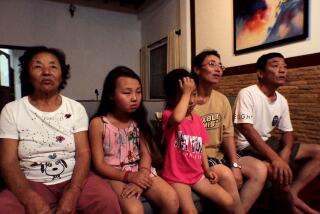North Korean refugee network fears crackdown
SEOUL — A clandestine network that helps North Koreans escape through China has gone deeper underground because of fears over what authorities in both countries have learned from the capture of two U.S. journalists who were released by Pyongyang this month, a missionary said today.
When they were arrested in March, Laura Ling and Euna Lee were reporting on an underground railroad that has helped thousands of people escape from North Korea.
“Their arrest reverberated through the aid network,” said Tim Peters, a missionary in Seoul who oversees aid work in northeast China. “It has made an already difficult situation 10 times more difficult. We now have to be more prudent in every phase of our operation.”
Much remains unclear about precisely what evidence North Korean and Chinese authorities might have gotten their hands on after the journalists were detained by North Korean border guards.
At the time of their arrest, Ling and Lee were working for Internet-based Current TV. Their American cameraman, Mitch Koss, escaped back into China, where he was met by Chinese border officials.
Last week, a South Korean pastor working with North Korean orphans in China told Chosun Ilbo, a Seoul newspaper, that Chinese authorities had shut down five safe houses he operates. The TV team visited and filmed one of the secret sites just days before the two journalists were captured.
The Rev. Lee Chan-woo quoted Chinese interrogators as saying that they had confiscated video from Koss.
He said he had asked the cameraman not to identify the children.
“I allowed them to report on the condition that they would not film the children’s faces,” Lee told the newspaper.
Lee said Chinese police confiscated his computer, camera and some documents. He said that the children were dispersed to families in China.
In an e-mail, Koss declined to comment.
Lisa Ling, sister of Laura Ling, declined to comment on the Chosun Ilbo report, saying that the two journalists soon planned to tell their side of the story. In an earlier interview with The Times, she had said her sister would never knowingly identify people she had interviewed.
“I think they were careful not to get anything like that on tape or in their notebook,” she said of interviews with missionaries and refugees.
The so-called underground refugee railroad is a loosely organized network of independent operators who seek to help defectors either for profit or out of humanitarian interests.
Brokers can charge $2,000 to $10,000 for the forged papers and contacts necessary to spirit people out of the country through China, from which they often move to other Asian nations, including South Korea.
But the often-porous border between China and North Korea is a dangerous realm, where ruthless border guards and undercover Chinese and North Korean police menace both missionaries and refugees.
In recent years, China has cracked down on the network, imprisoning those caught assisting North Korean defectors on charges that have included human trafficking.
“People in this network face dire consequences if discovered,” said Scott Bruce, a North Korea analyst for the nonprofit Nautilus Institute, a public policy think tank. “China has engaged in vicious human rights violations to send these defectors back. North Korea has a real incentive to make examples of anyone trying to escape their workers paradise.”
Peters, the missionary, said the border is more dangerous than ever. Even if Ling and Lee left their notes and video on the Chinese side when they approached the border, the move was irresponsible, he said.
“Everybody has to be hunkered down now simply because the Chinese now have more reason to try and break up these refugee networks,” Peters said. “It’s an embarrassment for them.”
--
Ju-min Park of The Times’ Seoul Bureau contributed to this report.
More to Read
Sign up for Essential California
The most important California stories and recommendations in your inbox every morning.
You may occasionally receive promotional content from the Los Angeles Times.










